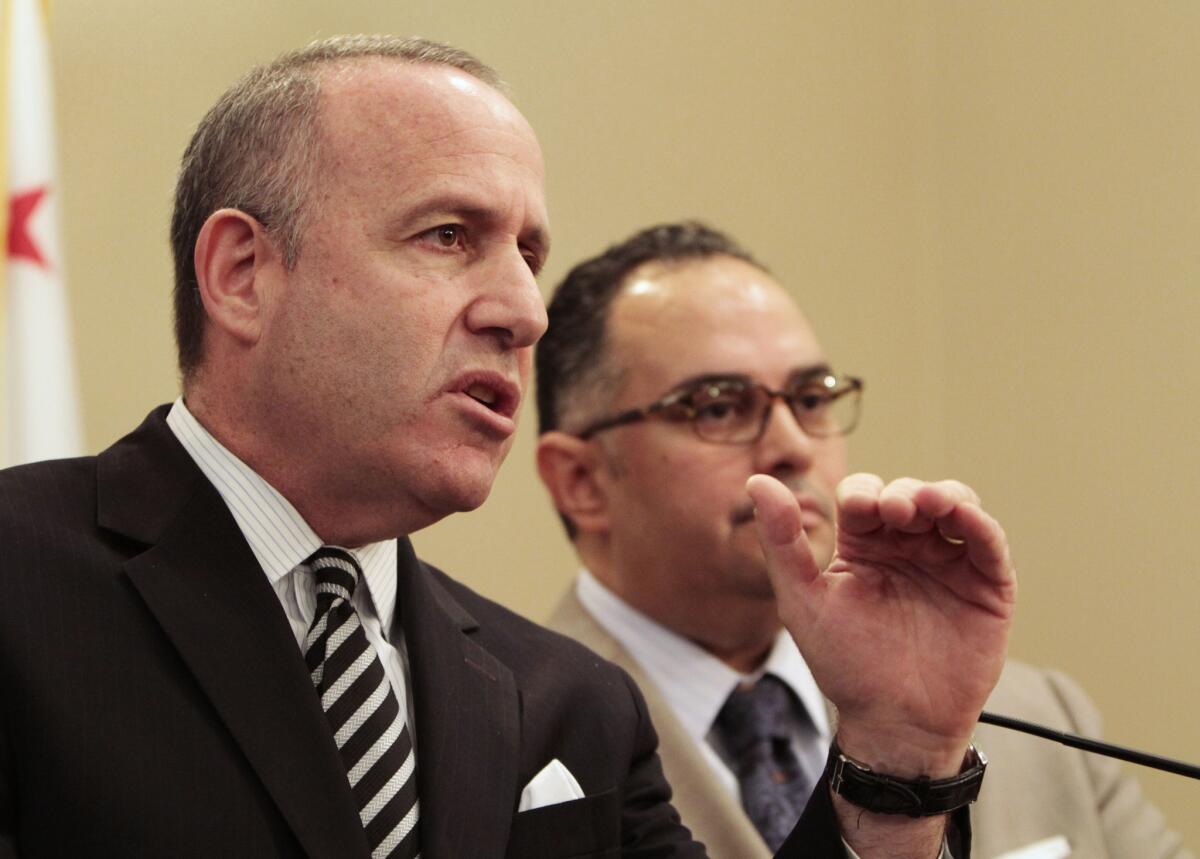Where is Democrats’ urgency on pension reform?

- Share via
SACRAMENTO — Democratic legislators read the polls. They heard the voters of San Jose and San Diego — San Jose, for crying out loud, a Democratic bastion.
They understand that voters everywhere are demanding public pension reform.
And they will deliver. They promise.
It’s just that it probably will not be before they start a monthlong recess July 3. Pencil in late August, just before they knock off for the year.
You might have thought there’d be a greater sense of urgency by the majority party in the state Capitol, given that on June 5 voters in San Jose and San Diego, by landslide margins, adopted dramatic cutbacks to their city pension plans.
Californians increasingly have been insisting on a rollback in public pensions. Retirement costs have been eating up larger chunks of local government budgets, cutting severely into services.
Judges have ruled that you can’t touch the promised benefits of current public workers, although reformers seem willing to retest that doctrine in court. In any event, there’s no reason that the benefits of future employees can’t be substantially trimmed.
The urgency for Democrats in Sacramento, you’d think, would be the November election. On the ballot will be Gov. Jerry Brown’s initiative to raise taxes in order to avoid deep cuts in education funding, mainly to K-12 schools, but also to colleges.
Virtually no one in the Capitol believes that voters will approve a state tax increase unless the Legislature and governor have enacted serious pension reform.
And to delay the reform until late August would merely provide the anti-tax crowd an additional two months to shout that Sacramento doesn’t get it.
Democrats understand. They just don’t feel the urgency.
“We have an obligation to deliver pension reform. It’s essential,” says Senate leader Darrell Steinberg (D-Sacramento), echoing what he has been saying for months. “The question is whether it will be July or August.”
The first priority for now, say Steinberg and Assembly SpeakerJohn A. Perez(D-Los Angeles), is to complete a state budget for the fiscal year that starts July 1.
No argument there. But budget negotiations between the governor and Democratic legislative leaders seemed practically completed Wednesday. The remaining budget bills could be passed relatively quickly.
Tax politics, incidentally, have played into the budget negotiations — for the better.
You haven’t heard a lot of rough, in-your-face rhetoric between Brown and Democrats, unlike last year when Steinberg and Perez were “deeply dismayed” by the governor’s veto of their first gimmicky budget.
This year, there have been quiet, gentle negotiations aimed at avoiding a budget veto and angry rhetoric. Democrats have figured out that this sort of bombast just sours the public on Sacramento and would turn off voters from the tax hike.
“The more drama and the more fighting, especially between Democrats, the more problematic it will be to pass the measure in November,” Steinberg says.
“People have gotten so used to the overwrought drama of the budget season that they see it as a ritual, and not a good ritual. People roll their eyes…. We need to create some momentum around achievement. Around production, around getting things done.”
No argument there either. So what about pension reform?
It must get in line behind other priorities: home-foreclosure protection and the bullet train.
A foreclosure package is practically a wrap.
High-speed rail has been a slow go. It no longer is popular with the public. Projected costs have doubled — and bells and whistles have been removed — since voters authorized building the Los Angeles-to-San Francisco line. It’s still a mystery how all the $68 billion in construction costs will be raised.
But Brown is insisting that the Legislature authorize an initial sell of $2.7 billion in state bonds — at a borrowing cost of roughly $180 million annually for 30 years — to trigger federal funding of $3.3 billion. That would build the initial stretch of track in the San Joaquin Valley.
“I want to get high-speed rail done before the recess,” Steinberg says. “Not that it’s that popular.”
He and Brown are afraid that the feds will back out of the deal if the state doesn’t soon begin putting up money. “The longer it goes on there’s a risk,” the Senate leader says.
“There’s a risk of us going ahead because we don’t have guaranteed funding for the future. But there’s a risk in not doing it. The state is hungry for forward thinking. For infrastructure, construction work. The risk of not doing it is greater than in doing it.”
That’s all speculative. But the risk to the tax proposal and education funding of continued pension procrastination is unambiguous.
Everyone knows the political problem with pension reform. “It’s got labor out of our comfort zone,” says Dave Low, executive director of the California School Employees Assn., who also heads a labor coalition fighting major pension rollbacks.
Labor largely foots the bill for Democratic election campaigns. And Brown also is counting on donations from public employee unions for his tax campaign. So this is delicate.
Brown has proposed a tougher overhaul than what Democrats have been willing to accept.
A special two-house committee held several hearings on pensions and came up empty.
“The whole hearing process was just a dog and pony show,” contends a Republican member, Sen. Mimi Walters of Laguna Niguel. “We didn’t have any meaningful discussion on pension reform.”
“If Democrats were smart,” says Marcia Fritz, a leading pension-reform activist, “they would make it their issue and get in front of the parade.”
Yes, and they wouldn’t recess for summer vacation until the job was done.
More to Read
Sign up for Essential California
The most important California stories and recommendations in your inbox every morning.
You may occasionally receive promotional content from the Los Angeles Times.











